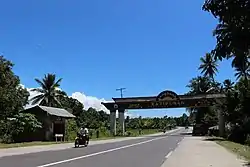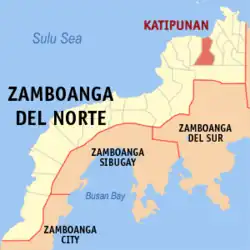Katipunan, Zamboanga del Norte
Katipunan, officially the Municipality of Katipunan (Cebuano: Lungsod sa Katipunan; Subanen: Benwa Katipunan; Chavacano: Municipalidad de Katipunan; Tagalog: Bayan ng Katipunan), is a 2nd class municipality in the province of Zamboanga del Norte, Philippines. According to the 2020 census, it has a population of 44,661 people.[3]
Katipunan
Lubungan | |
|---|---|
| Municipality of Katipunan | |
 Archway Sign of Katipunan | |
 Flag  Seal | |
| Nickname: Adventure Capital of Zamboanga del Norte | |
 Map of Zamboanga del Norte with Katipunan highlighted | |
OpenStreetMap | |
.svg.png.webp) Katipunan Location within the Philippines | |
| Coordinates: 8°30′48″N 123°17′05″E | |
| Country | Philippines |
| Region | Zamboanga Peninsula |
| Province | Zamboanga del Norte |
| District | 2nd district |
| Founded | February 2, 1914 |
| Named for | Katipunan |
| Barangays | 30 (see Barangays) |
| Government | |
| • Type | Sangguniang Bayan |
| • Mayor | Jose Michael Meiko A. Wong |
| • Vice Mayor | Antonio B. Jumawak |
| • Representative | Glona G. Labadlabad |
| • Municipal Council | Members |
| • Electorate | 16,005 voters (2022) |
| Area | |
| • Total | 244.12 km2 (94.26 sq mi) |
| Elevation | 19 m (62 ft) |
| Highest elevation | 137 m (449 ft) |
| Lowest elevation | 0 m (0 ft) |
| Population (2020 census)[3] | |
| • Total | 44,661 |
| • Density | 180/km2 (470/sq mi) |
| • Households | 10,750 |
| Economy | |
| • Income class | 2nd municipal income class |
| • Poverty incidence | 52.86 |
| • Revenue | ₱ 192 million (2020) |
| • Assets | ₱ 384 million (2020) |
| • Expenditure | ₱ 227.1 million (2020) |
| • Liabilities | ₱ 109.5 million (2020) |
| Service provider | |
| • Electricity | Zamboanga del Norte Electric Cooperative (ZANECO) |
| Time zone | UTC+8 (PST) |
| ZIP code | 7109 |
| PSGC | |
| IDD : area code | +63 (0)65 |
| Native languages | Subanon Cebuano Chavacano Tagalog |
| Website | katipunan |
It is formerly known as Lubungan.[5]
History
Jose Rizal, Philippine national hero, had a farm here during his exile in Dapitan from 1892-1896.

St. Francis Xavier Church
In 1955, six barrios were created:[6]
- sitios of Malobog, Malupis, Linasan Manok, Gakol, Gimakan, Lipakan and Capasi as barrio Denoman;
- sitios of Boalboal, Malonglong, Lobongpre, Nanginan Upper, Larang, Lowang, Lawag, Sibog, Lindangan, Gumatob and Lumbayao as barrio Pinialan;
- sitios of Baoy, Tamara, Tamilokan, Labokan, Sinilog, Grap, Tobod, Larang, Senuelan, Sibutak, Kunalog, Sapanaga and Upper Lipoga as barrio Nanginan;
- sitios of Depog, Mate, Saloyong, Lanasan, Notap, Balangasan, Masoy, Upper Seraboc, Dapitan, Linay, Baoran, Bulaw, Siran, Kalayaw, Salay, Kalangag, Conon, Pinopoan, Dauwan, Takwas, Labob, Dabiac, Labaw, Diway, Toboy, Domala, Tolawan, Gotayan, Sirowan, Sigosoy, Dicayas, Kasaw, Denoman, Gimitan, Liliran, Sigamoc, Mosoman, Sikitan, Pierangan, Kitonoc, Parol, Karopay, Tokosawan, Nopiac, Ginokot, Lotowan, Logoc, Napangon, Gomanggay, Boyawan, Malonob, Dicayok, Silisi, Talisay, Tiyala, and Setog Proper as barrio Setog;
- sitios of Mamara, Tabenas, Kimay, Setubo, Diwakat, Sebalug, Liang, Balobohan, Libo, Sapa, Langob, Moliton, Lanapan, Calumbog and Bentunong as barrio Kanibongan; and
- sitios of Basangan, Tongilawan, Sikawang, Lagag, Singatong, Linabo, Luyoran and Palinan as barrio Basangan.
Geography
Climate
| Climate data for Katipunan, Zamboanga del Norte | |||||||||||||
|---|---|---|---|---|---|---|---|---|---|---|---|---|---|
| Month | Jan | Feb | Mar | Apr | May | Jun | Jul | Aug | Sep | Oct | Nov | Dec | Year |
| Average high °C (°F) | 29 (84) |
29 (84) |
30 (86) |
31 (88) |
30 (86) |
30 (86) |
29 (84) |
30 (86) |
30 (86) |
29 (84) |
29 (84) |
29 (84) |
30 (85) |
| Average low °C (°F) | 23 (73) |
23 (73) |
23 (73) |
24 (75) |
25 (77) |
25 (77) |
24 (75) |
24 (75) |
24 (75) |
24 (75) |
24 (75) |
24 (75) |
24 (75) |
| Average precipitation mm (inches) | 104 (4.1) |
76 (3.0) |
92 (3.6) |
97 (3.8) |
199 (7.8) |
238 (9.4) |
195 (7.7) |
193 (7.6) |
178 (7.0) |
212 (8.3) |
171 (6.7) |
110 (4.3) |
1,865 (73.3) |
| Average rainy days | 14.7 | 12.5 | 15.8 | 17.5 | 27.6 | 28.5 | 29.0 | 27.5 | 26.9 | 27.9 | 23.5 | 18.2 | 269.6 |
| Source: Meteoblue[7] | |||||||||||||
Barangays
Katipunan is politically subdivided into 30 barangays. Each barangay consists of puroks while some have sitios.
- Balok
- Barangay Dos (Poblacion)
- Barangay Uno (Poblacion)
- Basagan
- Biniray
- Bulawan
- Carupay
- Daanglungsod
- Dabiak
- Dr. Jose Rizal (Lower Mias)
- Fimagas
- Loyuran
- Malasay
- Malugas
- Matam
- Mias
- Miatan
- Nanginan
- New Tambo
- Patik
- San Antonio (Laoy)
- San Vicente
- Sanao
- Santo Niño
- Seres
- Seroan
- Singatong
- Sinuyak
- Sitog
- Tuburan
Demographics
|
| |||||||||||||||||||||||||||||||||||||||||||||||||||
| Source: Philippine Statistics Authority[8][9][10][11] | ||||||||||||||||||||||||||||||||||||||||||||||||||||
Economy
Notable personalities
- Adolfo Sevilla Azcuna (b. February 16, 1939) - Philippine Judicial Academy (PHILJA) Chancellor (since June 1, 2009) and the 153rd Associate Justice of the Supreme Court of the Philippines (October 24, 2002 – February 15, 2009).
- Eddie Laure
References
- Municipality of Katipunan | (DILG)
- "2015 Census of Population, Report No. 3 – Population, Land Area, and Population Density" (PDF). Philippine Statistics Authority. Quezon City, Philippines. August 2016. ISSN 0117-1453. Archived (PDF) from the original on May 25, 2021. Retrieved July 16, 2021.
- Census of Population (2020). "Region IX (Zamboanga Peninsula)". Total Population by Province, City, Municipality and Barangay. Philippine Statistics Authority. Retrieved 8 July 2021.
- "PSA Releases the 2018 Municipal and City Level Poverty Estimates". Philippine Statistics Authority. 15 December 2021. Retrieved 22 January 2022.
- Zamboanga del Norte: Province Brief History, Provincial Government of Zamboanga del Norte, retrieved 2012
- "An Act Converting into Barrios Certain Sitios in the Province of Zamboanga Del Norte". LawPH.com. Archived from the original on 2012-07-14. Retrieved 2011-04-12.
- "Katipunan: Average Temperatures and Rainfall". Meteoblue. Retrieved 30 April 2020.
- Census of Population (2015). "Region IX (Zamboanga Peninsula)". Total Population by Province, City, Municipality and Barangay. Philippine Statistics Authority. Retrieved 20 June 2016.
- Census of Population and Housing (2010). "Region IX (Zamboanga Peninsula)" (PDF). Total Population by Province, City, Municipality and Barangay. National Statistics Office. Retrieved 29 June 2016.
- Censuses of Population (1903–2007). "Region IX (Zamboanga Peninsula)". Table 1. Population Enumerated in Various Censuses by Province/Highly Urbanized City: 1903 to 2007. National Statistics Office.
- "Province of Zamboanga del Norte". Municipality Population Data. Local Water Utilities Administration Research Division. Retrieved 17 December 2016.
- "Poverty incidence (PI):". Philippine Statistics Authority. Retrieved December 28, 2020.
- "Estimation of Local Poverty in the Philippines" (PDF). Philippine Statistics Authority. 29 November 2005.
- "2003 City and Municipal Level Poverty Estimates" (PDF). Philippine Statistics Authority. 23 March 2009.
- "City and Municipal Level Poverty Estimates; 2006 and 2009" (PDF). Philippine Statistics Authority. 3 August 2012.
- "2012 Municipal and City Level Poverty Estimates" (PDF). Philippine Statistics Authority. 31 May 2016.
- "Municipal and City Level Small Area Poverty Estimates; 2009, 2012 and 2015". Philippine Statistics Authority. 10 July 2019.
- "PSA Releases the 2018 Municipal and City Level Poverty Estimates". Philippine Statistics Authority. 15 December 2021. Retrieved 22 January 2022.
External links
This article is issued from Wikipedia. The text is licensed under Creative Commons - Attribution - Sharealike. Additional terms may apply for the media files.